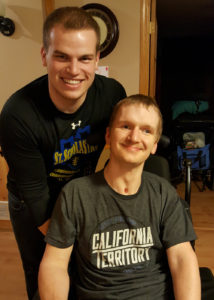Patient Care Experience as an Emergency Float Staff
 The emergency float position at ACR is a great way to get the patient care experience needed for application requirements for medical school and PA school, according to Alex Mangan. After graduating last year with a BS in biochem and a minor in Spanish, he was taking a gap year. He had heard that ACR was a good place for CNA-type jobs, and then a friend highly recommended ACR as a company. He said, “I knew ACR was going to be beneficial for me no matter what route I went,” so he applied at ACR and was hired to work full-time. In just 4 ½ months he acquired 800 hours of patient care experience.
The emergency float position at ACR is a great way to get the patient care experience needed for application requirements for medical school and PA school, according to Alex Mangan. After graduating last year with a BS in biochem and a minor in Spanish, he was taking a gap year. He had heard that ACR was a good place for CNA-type jobs, and then a friend highly recommended ACR as a company. He said, “I knew ACR was going to be beneficial for me no matter what route I went,” so he applied at ACR and was hired to work full-time. In just 4 ½ months he acquired 800 hours of patient care experience.
Comparing Hospital Scribe vs Direct Care at ACR
Having worked as a hospital scribe alongside doctors and medical professionals, he was able to compare being a scribe versus being a direct care professional at ACR. He found that as a scribe he learned a lot about documentation and made great connections, but he realized he was spending all of his time at a computer. He wanted more hands-on patient care experience rather than just watching a doctor handle all the patient interaction. Alex commented, “As a scribe you listen in and communicate with the doctor, but at ACR you have to communicate to a whole team—nurses, supervisors, other staff, guardians, and the residents themselves. You’re working directly with the residents and learning how to help residents as a whole.”
Wide Range of Patient Care Experience
Once he was trained in the basics of being a direct care professional at ACR he decided to try the emergency float position. Being a float allowed him to work in a variety of ACR homes assisting a wide range of people with medical support needs and daily living skills such as self-care, meals, and transportation. He’s received substantial training in medical care and terminology and has gained significant patient care experience with medical equipment like g-tubes, trachs, and oxygen as well as a wide range of adaptive equipment for people with disabilities. He’s also been able to get a feel for the impact of certain medical conditions and to see how patients with similar conditions and needs can be entirely different.
E-Float Pay and Bonuses
The emergency float position has been good for building up his bank account, too. The pay ranges from $13.39 to $17.91 per hour depending on the shift, with opportunities for overtime. Alex commented that he’s making good progress paying back student loans, and he was happy to receive an emergency float bonus of $3000.
ACR offers quarterly bonuses for full-time emergency floats:
- $5000 bonus for September through November
- $2000 bonus for December through February
- $3000 bonus for March through May
